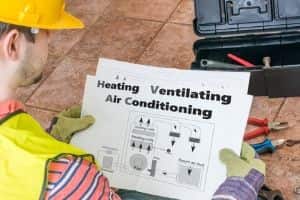
Backpack… check.
Notebooks… check.
HVAC running correctly… check?
It’s August and in order to make sure the back to school season runs smoothly, it’s time for you to get schooled on the basics of your HVAC system. The summer heat isn’t over yet, and your family will need an air conditioning system that can hold up through this season and what’s to come.
A high-quality system should continue to work through even the hottest of summer days and the coldest of winter nights, but malfunctions can occur and HVAC systems need care over time.
This is your back to school study guide for all things HVAC. Keep reading to discover the ins and outs of your heating and cooling system. From how your HVAC systems work to maintenance and repair, we’ve got all the answers to help you ace whatever test life assigns.
Understanding the Basics of Your HVAC System
 The first lesson to learn is that there are various moving parts that help your HVAC system to work properly. Generally speaking, your unit will have an element that heats or cools the air, and then an air handler that movies that air throughout your home.
The first lesson to learn is that there are various moving parts that help your HVAC system to work properly. Generally speaking, your unit will have an element that heats or cools the air, and then an air handler that movies that air throughout your home.
In air conditioners, you’ll use evaporator coils and in furnaces, you have a burner or heating element. For most homeowners, you depend on a central HVAC unit to operate both for heating and cooling, but there are also other alternative methods you may have in your home, including:
- Forced Air Systems
- Gravity Systems
- Radiant Systems
- Ductless Systems
Depending on what you have currently in your home, you should consult with your HVAC technician to determine what’s right in terms of maintenance and care.
The Benefits of HVAC System Maintenance
The most common HVAC malfunctions occur over time and continued use. However, there are a few ways you can avoid these common issues with these preventative processes.
 Choose HVAC placement carefully: Make sure your air conditioner is installed on flat, solid ground. Allow a clearing of about 2 feet surrounding your air conditioner to allow ease of access and void overcrowding.
Choose HVAC placement carefully: Make sure your air conditioner is installed on flat, solid ground. Allow a clearing of about 2 feet surrounding your air conditioner to allow ease of access and void overcrowding.- Buy a quality air filter: Selecting a high-quality filter can drastically change the lifespan of your HVAC. The less unidentified foreign objects entering your ducts, the better. Pleated air filters keep out the natural dirt and grime that may be sucked in as the air is filtered from the outside.
- Check your ducts for holes: Almost 25% of your system’s heating and cooling ability can be lost through small holes in your ductwork. It is important to check your ductwork often to ensure there are no minor or major defects allowing air to escape.
Other more severe problems can occur over time, so it is important to pay attention to minor changes in your system. If you think your HVAC is malfunctioning, call a professional to fix the issue before it becomes worse.
When Are Repairs Needed?
 Eventually, as with all machines, you will have to repair your HVAC system. When this day comes, you will likely notice the issue very quickly.
Eventually, as with all machines, you will have to repair your HVAC system. When this day comes, you will likely notice the issue very quickly.
There are many signs that point to a system in need of repair. If you recognize these signs early, you could potentially save your system from long-term damage.
Here are some things to look out for as you transition from summer to fall:
- Loud noises coming from your HVAC: These noises may mean that part of your HVAC is not functioning correctly or efficiently. If these noises persist, it is best to turn your system off and call a professional as soon as possible.
- No hot or cool air: If you are not feeling the temperature change after changing the number on the thermostat, then you have a problem. Something in your HVAC system is in need of repair. Again, call a professional to locate and correct the problem before it worsens.
Now you know a little bit more about your HVAC system. It is important to be proactive, and don’t get schooled by your in-home heating and cooling. Instead, pay attention and call Comfort 1 Heating & Air Conditioning Services at (818) 620-9554 if you think you may need a checkup or repair.
